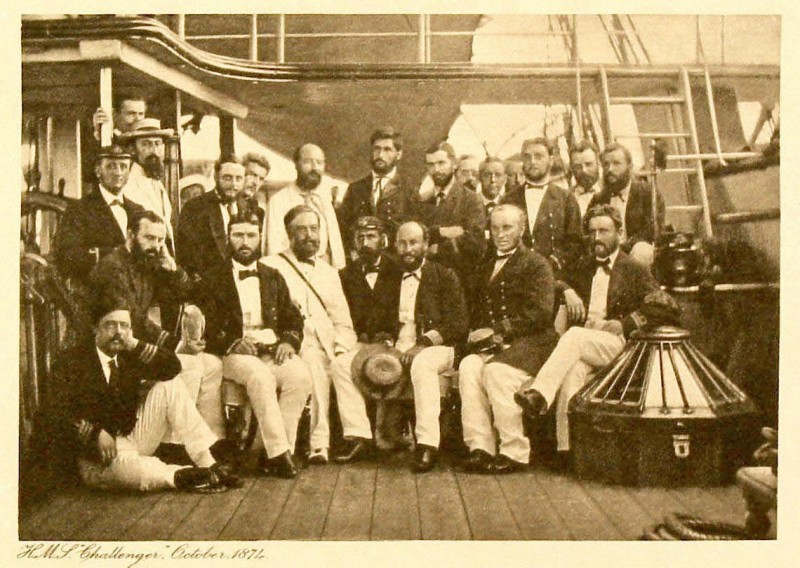The Challenger 150 Conference
Stamatia Galata
Liverpool John Moores University

Caption:HMS Challenger Expedition Crew in 1874 - Image © The Trustees of the Natural History Museum, London
I cannot express enough my gratitude towards the Challenger Society, which supported me with the travel grant for my participation to The Challenger 150 conference hosted by The Natural History Museum and Imperial College, in London from 5th to 9th of September 2022.
It was my honour to participate with my talk on deep-sea mining to a conference, that it signifies the birth of international and interdisciplinary oceanography. After 150 years from its first expedition, scientists in every level of their career gathered to celebrate this event and cover the latest research in oceanography. It was amazing that in 3 days, in 3 different places a variety of topics were covered, from marine conservation and geology to arts. There were so interesting parallel sessions that it was hard to choose which I should attend.
During the conference, I had the opportunity to meet people peers from different backgrounds working in similar topics, but also senior researchers, who gave me advice how I should proceed with my studies. In addition, plenary sessions, such as Early-Career Mixer Event, offered me the chance to discuss about the future in terms of CV with experts.
Furthermore, I would like to share the highlight for me from this conference; I imagine that you will expect to hear something about my talk. Therefore, for me, it was the last talk of the conference about the history of HMS Challenger. Challenger was innovative from the beginning; its crew included an official photographer, an artist, who was a woman, as well as two parrots, a dog, and a goat. Challenger, already from 1872, shows us that science includes every discipline and everyone regardless background or origin. It is an inspiring fact.
Overall, my experience in the Challenger 150 Conference was unique. For the first time, I was in a conference so big, and sometimes it felt intimidating and overwhelming but, I couldn’t be happier for this. I met amazing people, developed my soft skills and I gained more confidence.
Profile
After completing my BA in History, Archaeology and History of Art, MA in Black Sea and MSc in Maritime Archaeology, life took me in totally unexpected and interesting career path. In Liverpool John Moores University, I started my PhD project, which is on the automated quantification of microplastics using open-source python code. However, my project doesn’t involve only plastic particles, at the same time I study the quantity and quality of the organic matter in the deep-sea sediment and organisms.
Latest News
Royal Society Publishing Photography Competition 2025
Please see a message from the Royal Society below:
We are delighted to announce that the 2025 Competition is now open for entries until 15 August for a chance to win £1000! The competition celebrates the power of photography in conveying the wonder of science happening all around us and photographs can be submitted in the categories of: Astronomy, Behaviour, Earth Science and Climatology, Ecology and Environmental Science, and Microimaging.
The competition is free to enter and open to anyone studying or working in science at graduate level or above. Category winners will receive a one-year membership to the Royal Photographic Society and the overall winner will receive a grand prize of £1,000. Find out more: https://bit.ly/RSPphotocomp
October 2025 MEDIN Workshop: Marine Data Management, Governance and the MEDIN toolset
The Marine Environmental Data and Information Network (MEDIN) are pleased to announce that registration is now open for the next occurrence of our popular free online training workshop: ‘Marine Data Management, Governance and the MEDIN toolset’ on the 13th – 17th October 2025 on OceanTeacher Global Academy.
Marine Data Management, Governance and the MEDIN toolset
The Marine Environmental Data and Information Network (MEDIN) and OceanWise are delighted to invite you to attend our popular free online training workshop: ‘Marine Data Management, Governance and the MEDIN toolset’ on the 19th – 23rd of May 2025.
